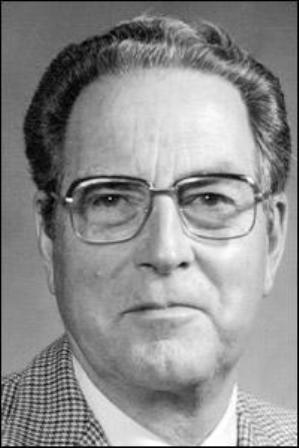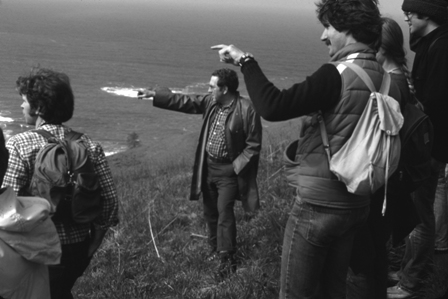Biographical Sketch
William 'Bill' Chilcote (1918-2006) was born in Washington , Iowa, to Frank and Ethel Chilcote.
 After graduating with a Bachelor of Science in forestry and serving in the U.S. Navy in World War II, he returned to Iowa State University and began his career as an instructor in forestry and earned a Ph.D. in plant physiology in 1950. He received a professorship in plant ecology in the Department of Botany and Plant Pathology at Oregon State University in 1950 where he taught until his retirement in 1982. In 1956 Bill received the Carter Award for Outstanding Teaching. He received a Fulbright Scholarship as a visiting professor in Helsinki , Finland in 1957, where he and his family lived for a year.
After graduating with a Bachelor of Science in forestry and serving in the U.S. Navy in World War II, he returned to Iowa State University and began his career as an instructor in forestry and earned a Ph.D. in plant physiology in 1950. He received a professorship in plant ecology in the Department of Botany and Plant Pathology at Oregon State University in 1950 where he taught until his retirement in 1982. In 1956 Bill received the Carter Award for Outstanding Teaching. He received a Fulbright Scholarship as a visiting professor in Helsinki , Finland in 1957, where he and his family lived for a year.
Bill's lifelong vocation of studying and teaching plant ecology was also his avocation. Don Zobel (Emeritus Professor of Plant Ecology) remembers that " Bill was the sole terrestrial plant ecologist in the College of Science when I arrived in 1968. His emphasis shifted toward the community level early in his career; always, he was anxious for students to get the "big picture"!
Bill taught undergraduate plant ecology, advanced plant ecology, and plant geography. Bill emphasized field experience for his classes, including trips to McDonald Forest, Marys Peak, the coast, emphasizing sand dunes, and across the Cascades into central Oregon . The  advanced plant ecology was a field methods course, which evolved primarily into field trips, including one-day marathons into the shrub-steppe east of Bend and to the north coast.
advanced plant ecology was a field methods course, which evolved primarily into field trips, including one-day marathons into the shrub-steppe east of Bend and to the north coast.
Bill's career included the post-World War II boom in new PhD's and the campaign to have professionals in applied life sciences add a doctorate to their resume'; some of his early graduate students were veterans with substantial work experience. His career also extended well into the post-Earth Day emphasis on ecology; later students were younger and fewer chose topics in applied ecology. In addition to serving as a major professor for at least 37 students, Bill was a favorite choice for other graduate program committees, serving on hundreds.
Bill's graduate students worked on topics from physiological ecology to regional community patterns, centered in western Oregon, but ranging from Alaska to southern California and east to Utah . Major emphases included vegetation and fire patterns on the east slope of the Cascades, vegetation and succession on Marys Peak , and all vegetation types along the Oregon coast.
Bill's contribution to plant ecology was primarily through his students, both in class and through graduate student research. Bill also left a field trip legacy, including his help to me when I arrived. That summer, I taught an ecology-for-teachers class, and Bill spent days with me in the valley, on Marys Peak, on the coast, and across the Cascades, Bill describing what he knew about the vegetation and history of the stops we made, and me furiously taking no tes. Those no tes were the basis of my trips for several years, and I carried them as a kind of security blanket for some time after that. Even 35 years later, Bill would have recognized most of my trips.
Working with Bill was a delight, and I fondly remember trips with him and the student gatherings he and Marj hosted. I particularly admired Bill's rapport with students, his willingness to spend time with them, and his ability to have them want to spend time with him.
I have described Bill's professional life, but certainly not all that he was - the laughter he evoked and joined in so easily, the self-deprecating humor, Bill as cornerstone of the highly attended twice-daily coffee break, and the man who so enjoyed the "anti-senility kit" his sons gave him when he turned 50. When he retired, Bill truly left the department and seldom returned, giving his time to family concerns, travel, and a re-acquaintance with his banjo."
Bill is survived by his wife, Marjorie, son Mark and wife Vica of Beaverton ; son John Chilcote and brother David O. Chilcote of Corvallis ; three granddaughters; one great-grandson; two nieces and two nephews.
Contributions in the name of William Chilcote can be made to the Botany and Plant Pathology Endowment in Honor and Memory of Alumni and Friends in support of educational programs in the Department.